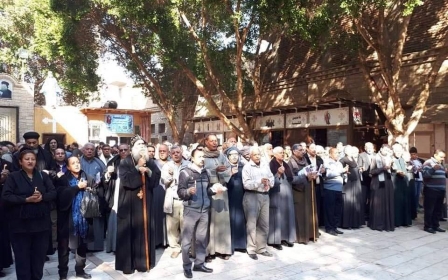Missing Egyptian activist feared killed in escape bid, friends say

Friends of missing Egyptian activist Mostafa al-Naggar fear he may have been killed by border guards while trying to escape the country.
Naggar, a prominent human rights activist who served in his country's first elected parliament after the revolution that toppled longtime president Hosni Mubarak in 2011, was last seen on 28 September, his wife, Shaimaa, told Middle East Eye.
In their last phone call, she said, he told her that he was in the southern city of Aswan and would return before a court hearing he was due to attend in October relating to his appeal of a conviction of "insulting the judiciary" which he denied and said was politically motivated.
All Naggar’s friends are worried he might have been killed. Three months of disappearance is not a normal situation for a person of his profile
- Islam Lofty, friend of Naggar
On Monday, she told MEE she had yet to receive any information from authorities about Nagger's disappearance.
Islam Lotfy, a longtime friend of Naggar, told MEE he had been planning to leave Egypt via its southern border with Sudan with the help of smugglers in September.
Lotfy said that he had heard accounts relayed to him by purported witnesses who said that Naggar might have been killed by Egyptian border guards. Previous reports had suggested that Naggar had been arrested while on a sightseeing trip to Aswan.
MEE has been unable to independently verify details of the accounts of Naggar's disappearance.
Egyptian officials did not respond to requests this week for comment on speculation that the activist may have been killed.
Arrest denied
Naggar was sentenced to three years in prison in December last year, and had been expected to attend court to appeal the sentence on 15 October.
Following his failure to appear, Naggar’s lawyer, Negad El-Borai, said he believed he had been detained at a military detention facility in Aswan.
But days later, Egyptian authorities officially denied arresting him.
In a statement dated 18 October, the Egyptian State Information Service (SIS) said it “categorically denies” that Naggar was arrested or that he was forcibly disappeared. It added that he “willingly escaped” from the court hearing scheduled for 15 October.
Amr al-Shobaki, a former MP and friend of the missing politician, also said that two senior Egyptian officials had told him that Naggar was not in custody and that his whereabouts remained unknown.
Shobaki said Diaa Rashwan, head of the State Information Service (SIS), which runs the Egyptian government's official press centre, and Mohamed Faek, chairman of the government-run National Council for Human Rights, told him Naggar intentionally disappeared to escape his prison sentence.
Revolutionary icon
Naggar, a former member of the Muslim Brotherhood and one of its youth leaders, left the organisation in 2005 over ideological differences with its leadership.
He was an icon of the 2011 revolution and one of the key organisers of the Tahrir Square protests that led to the overthrow of Mubarak.
Following the revolution, he was a founding member of the secular al-Adl party. He was the only member of the party to win a seat in parliament.
In his last article, published on his behalf by his wife, Shaimaa, Naggar dismissed the court ruling against him as “politicised” and “devoid of all foundations of justice”.
He is one of 19 defendants in the case, including Morsi, prominent politician and academic Amr Hamzawy and journalist Abdel Halim Kandil.
Naggar said that the only piece of evidence cited in court was a speech he delivered in parliament in 2012 discussing alleged irregularities in the trials of Mubarak after the former president was overthrown.
In his speech, Naggar condemned the judiciary’s failure to bring to justice those responsible for killing more than 1,000 protesters during the revolution.
Escape plan
Two of Naggar’s friends told MEE that Naggar believed that his three-year prison term would be upheld and had therefore decided to leave the country ahead of the court ruling.
Lotfy, speaking to MEE from London, said Naggar had told mutual friends that he wanted to travel to the United Kingdom but that he feared he would be arrested if he attempted to travel through an airport.
He said there was no evidence to support lawyers’ belief that Naggar is being held at Aswan’s Al-Shallal detention facility, given the government’s repeated denials.
“The reasonable assumption is that the Egyptian government, had it detained him, would have disclosed his whereabouts and accused him of attempting to flee illegally,” he said.
What we know for a fact is that Naggar was on his way to leave Egypt because he did not want to sacrifice his freedom by serving an unjust three-year prison sentence
- Islam Lofty, friend of Naggar
The second account of Naggar’s disappearance, which Lotfy believes is more plausible, is that Naggar might have been shot by Egypt’s border guards on his way to Sudan.
“He was part of two convoys travelling with the help of smugglers via the land borders with Sudan,” Lotfy told MEE.
“The first convoy left successfully, but people who managed to flee with the first convoy say that they heard gunfire on the second convoy and then it did not cross the borders,” he added, citing individuals he spoke with.
“What we know for a fact is that Naggar was on his way to leave Egypt because he did not want to sacrifice his freedom by serving an unjust three-year prison sentence,” Lotfy said.
He added that Egyptian authorities are responsible for his safety as an Egyptian citizen, even if he was convicted.
Fear over disappearance
“All Naggar’s friends are worried he might have been killed. Three months of disappearance is not a normal situation for a person of his profile,” he said.
He called on Egyptian authorities to disclose information on people who were detained at the borders in October, and whether there was gunfire on those attempting to flee.
“It is our right to know what happened in full transparency,” he added.
Amr Magdy, Egypt researcher at Human Rights Watch (HRW), told MEE on Monday that his organisation is concerned about Naggar’s life due to Egypt’s “habit of lying and cover-ups”.
“Enforced disappearance means that authorities would arrest a person but refuse to acknowledge the arrest or disclose his whereabouts,” he said.
However, Magdy said the state is responsible for looking for missing individuals, and should engage his family in this effort. He added that HRW questions the Egyptian state’s narrative due to its “track record of misinformation” in cases similar to Naggar’s.
“His disappearance is concerning as we know that Egyptian state agencies routinely cover up cases of enforced disappearance,” he said.
Egyptian authorities are suspected of forcibly disappearing at least 1,520 people since 2013, according to the Stop Enforced Disappearance campaign. The United Nations has documented 258 cases of forced disappearance in the 12 months leading up to last May.
Stay informed with MEE's newsletters
Sign up to get the latest alerts, insights and analysis, starting with Turkey Unpacked
Middle East Eye delivers independent and unrivalled coverage and analysis of the Middle East, North Africa and beyond. To learn more about republishing this content and the associated fees, please fill out this form. More about MEE can be found here.






